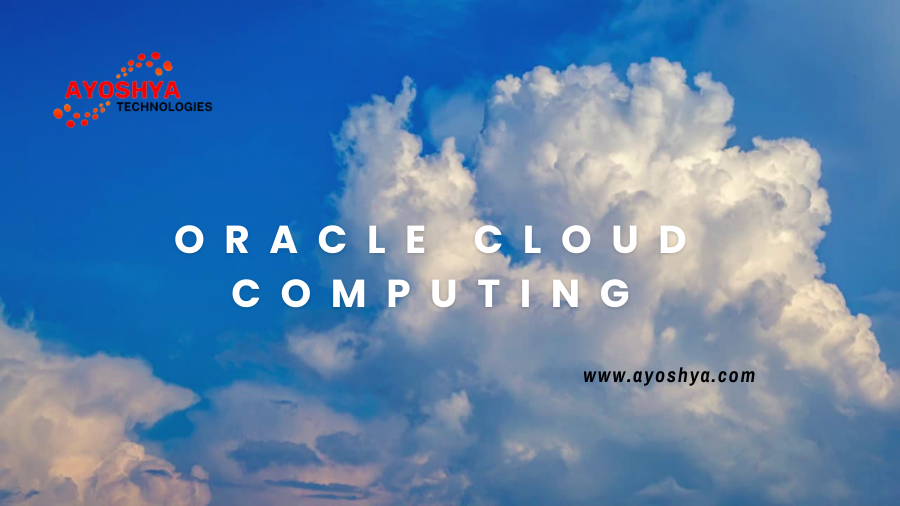Unlocking the Power of Oracle Cloud Computing: A Comprehensive Guide
Oracle Cloud Computing: A Game-Changer for Businesses
Welcome to the future of business operations – Oracle Cloud Computing. As the digital landscape evolves, businesses are turning to cloud solutions to enhance efficiency, scalability, and overall performance. In this article, we’ll dive deep into the realm of Oracle Cloud Computing, exploring its offerings, benefits, and why it stands out in the competitive cloud computing arena.
I. Introduction
A. Definition of Oracle Cloud Computing
Oracle Cloud Computing refers to the delivery of computing services, including storage, databases, networking, analytics, and more, over the internet. It eliminates the need for organizations to own and maintain physical hardware, providing a flexible and scalable solution for their IT needs.
B. Significance in the Modern Business Landscape
In an era where agility and innovation drive success, Oracle Cloud plays a pivotal role. It empowers businesses to adapt quickly to changing demands, reduce costs, and leverage advanced technologies without the burden of managing complex infrastructures.
II. Understanding Oracle Cloud Offerings
A. Oracle Infrastructure as a Service (IaaS)
Oracle IaaS provides virtualized computing resources over the internet. This includes virtual machines, storage, and networking, allowing businesses to scale up or down based on their requirements.
B. Oracle Platform as a Service (PaaS)
Oracle PaaS offers a platform allowing businesses to develop, run, and manage applications without the complexities of building and maintaining the underlying infrastructure.
C. Oracle Software as a Service (SaaS)
Oracle SaaS delivers software applications over the internet, eliminating the need for users to install, maintain, and upgrade software locally.
III. Advantages of Oracle Cloud Computing
A. Scalability and Flexibility
One of the significant advantages of Oracle Cloud is its ability to scale resources up or down based on demand. Whether you’re a startup or a large enterprise, Oracle Cloud adapts to your needs.
B. Cost-Efficiency
By eliminating the need for extensive on-premises infrastructure, Oracle Cloud reduces capital expenses. Businesses pay only for the resources they use, optimizing cost-efficiency.
C. Security Measures
Oracle prioritizes the security of data in the cloud. With advanced encryption, access controls, and continuous monitoring, businesses can trust Oracle Cloud with their sensitive information.
D. Integration Capabilities
Oracle Cloud seamlessly integrates with existing on-premises systems and other cloud services, providing a unified and comprehensive solution for businesses with diverse IT landscapes.
IV. Real-world Applications
A. Case Studies Across Industries
From finance to healthcare and manufacturing, Oracle Cloud has proven its value across various industries. Case studies showcase how businesses leverage Oracle Cloud to streamline operations and drive innovation.
B. Testimonials from Businesses Embracing Oracle Cloud
Real-world experiences from businesses highlight the positive impact of Oracle Cloud on their efficiency, agility, and overall success.
V. Key Features and Tools
A. Oracle Autonomous Database
The Autonomous Database is a groundbreaking feature that automates routine database tasks, reducing manual intervention and enhancing performance.
B. Oracle Cloud Infrastructure (OCI)
OCI provides high-performance computing capabilities, allowing businesses to run demanding workloads with ease.
C. Oracle Cloud Functions
Oracle Cloud Functions enable serverless computing, allowing developers to focus on writing code without worrying about infrastructure management.
VI. Oracle Cloud vs. Competitors
A. Comparative Analysis
A side-by-side comparison of Oracle Cloud with other major cloud providers highlights the unique advantages that make Oracle Cloud a preferred choice.
B. Unique Selling Points of Oracle Cloud
Oracle Cloud’s strengths, such as its comprehensive suite of services, focus on security, and seamless integration, set it apart from competitors.
VII. Implementation Best Practices
A. Planning and Assessment
Before migrating to Oracle Cloud, businesses should conduct thorough planning and assessment to ensure a smooth transition.
B. Migration Strategies
From lift-and-shift approaches to rearchitecting applications, businesses can choose migration strategies that align with their goals.
C. Continuous Monitoring and Optimization
Regular monitoring and optimization ensure that businesses make the most of Oracle Cloud resources, both in terms of performance and cost.
VIII. User Experience
A. Intuitive Interface
Oracle Cloud offers an intuitive and user-friendly interface, making it accessible to both IT professionals and business users.
B. User Testimonials on Ease of Use
Users share their experiences, highlighting the simplicity and efficiency of Oracle Cloud’s interface.
IX. Future Trends in Oracle Cloud Computing
A. Integration of Artificial Intelligence
Oracle Cloud is anticipated to integrate advanced artificial intelligence capabilities, enhancing analytics, automation, and decision-making.
B. Advancements in Cloud Security Measures
As cybersecurity threats evolve, Oracle Cloud is expected to stay at the forefront of security innovations, ensuring robust protection for businesses.
C. Expansion of Oracle Cloud Offerings
Oracle will likely expand its cloud offerings to cover a broader range of services, catering to the evolving needs of businesses.
X. Conclusion
A. Recap of Oracle Cloud Benefits
In conclusion, Oracle Cloud Computing emerges as a game-changer for businesses, offering unparalleled scalability, security, and integration capabilities.
B. Encouragement for Businesses to Embrace Cloud Computing
As the digital landscape continues to evolve, the article encourages businesses of all sizes to embrace Oracle Cloud Computing for a competitive edge and future-proof operations.
XI. FAQs
A. Can Oracle Cloud handle large-scale enterprise operations?
Yes, Oracle Cloud is designed to handle large-scale enterprise operations, providing the scalability and resources needed for diverse business requirements.
B. How does Oracle ensure the security of data in the cloud?
Oracle employs advanced encryption, access controls, and continuous monitoring to ensure the security of data in the cloud.
C. What makes Oracle Cloud different from other cloud providers?
Oracle Cloud stands out with its comprehensive suite of services, focus on security, and seamless integration capabilities.
D. Are there industry-specific solutions offered in Oracle Cloud?
Yes, Oracle Cloud provides industry-specific solutions, tailoring its offerings to meet the unique needs of various sectors.
E. How can businesses seamlessly migrate to Oracle Cloud?
Businesses can choose from various migration strategies, including lift-and-shift or rearchitecting applications, and should conduct thorough planning and assessment for a smooth transition.
You may be interested in:
SAP & Oracle Consulting: A Winning Combination



